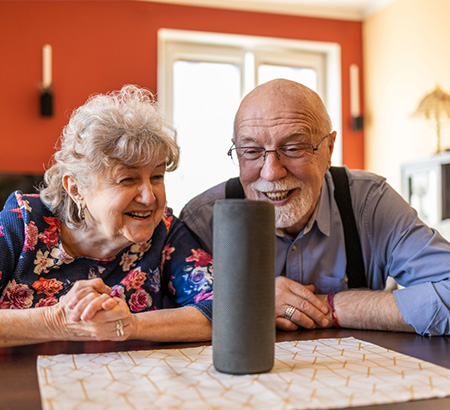
Life at home with Macular Degeneration
When you’re used to relying on your sight, any amount of vision loss from Age-related Macular Degeneration (AMD) can make everyday tasks more challenging. If you lose a significant portion of your central vision, it can become more difficult to do things like reading, watching TV, or cooking.
Thankfully, many resources available to you, offering smart ideas and useful tools to help you work around your vision limitations, maintain your independence, and enjoy your life.
Your eye care professional can help with suggestions or arrange for an occupational therapist to visit your home to provide tips that work for you.
Here are some helpful ideas to get you started.

Compensating for Vision Loss
Macular degeneration impacts only your central vision—what you see directly in front of you. Your peripheral vision, what you see to the sides, up, and down, will likely remain sharp. Try positioning things to make use of these areas of sharper vision. With practice, you may find you can improve your ability to do tasks, while relying on your peripheral vision.
You can also learn how to use your other senses to help you navigate your world. For example, when cooking, try slowly moving your hand about a foot over a pan on the stove to check that it’s centred over the burner. Too much heat in one spot might mean the burner is exposed.
Adjust your home lighting for low vision
With AMD, you may find that spaces begin to appear darker. Whether you’re trying to knit, do laundry, or chop vegetables, you may find it easier to use your remaining vision when working with good lighting.
Try these tips:
- Increase the light in a room overall or use a lamp focused on the task.
- Place lighting so it shines directly on what you’re trying to do, without shadows or glare.
- Consider using LED lights. Look for bulbs that are labelled as “warm,” which have less blue tones.
- Try using a light that clips onto a hat or a cap – great for shining light wherever you turn your head.
Use contrast to find things
Another way to make tasks easier is to create more contrast in the colours of objects.
Try these tips:
- Get a dark switch plate or put dark tape around light switches and doorknobs to make them stand out.
- Arrange brightly coloured pillows or a throw blanket to make it easier to see seating options.
- Place strips of coloured electrical tape or duct tape on the edges of steps, to help prevent falls.
- Use paint or nail polish in bright or dark colours to create contrast on objects such as hairbrushes, kitchen utensils, or tools.

Get help from a voice assistant or smart-home gadgets
A voice assistant can do everything from set an alarm, tell you the temperature, or make a grocery list. Add smart home devices like plugs and lightbulbs, and it can also turn on lights, adjust the thermostat, and much more. You can start with the free voice assistant on any smartphone or get a smart speaker for your home.

How to Keep Doing What You Love with Low Vision
You might think that you’ll have to give up your favourite pastimes as your vision deteriorates. In fact, you can make adjustments that may help you keep doing what you love for quite some time.
Keep reading
In addition to using good lighting and relying on your peripheral vision, try these adaptations to make reading easier—or to enjoy your books without having to read.
Try these tips:
- Use a magnifying glass to make words appear larger. Electronic magnifiers can put a larger image on the screen. Ask your eye care professional about these devices.
- Put a clear yellow sheet on top of a printed page to increase the contrast and see if that makes it easier to read.
- On a computer, tablet, or mobile phone, you can increase the size of the words and images. You can also switch the view to white letters on a black background, which may be easier to see.
- Explore audiobooks. Your local library may have books available on tape, CD, or on pre-recorded devices.
- Smart speakers can access audiobooks and read them to you—all you have to do is ask.
- Get a voice recognition program for your computer, tablet, or mobile phone that will read written text out loud.
Keep watching TV
If vision impairment from macular degeneration is getting in the way of enjoying your favourite shows.
Try these tips:
- Correct any glare on the screen. Close curtains or move the screen away from lights and windows.
- Adjust the settings. Many televisions have controls for brightness and contrast. Try adjusting them to make the picture easier to see.
- Find your visual sweet spot. You might have a stronger vision in one eye or be able to make better use of your peripheral (side) vision. Put your chair at a 45-degree angle to the screen and check if that’s better. Try other angles to find the best one.
- An adaptive product called a telescoping viewer can help you see what’s on the screen. Ask your eye care professional about these devices.
Making Adjustments at Work or in Your Home Office
Some work tasks and environments lend themselves to accommodations better than others. If you work mainly in an office, many tools and adjustments are available that fall within the definition of “reasonable accommodations”—in other words, they should be covered by your employer. Here are some examples of adjustments you can make at work or in your home office:
- A magnification device to help you read.
- A glare screen, larger monitor, or screen reader for your computer.
- A closed-circuit television (CCTV) to magnify items you need to read.
- A large-print keyboard.
- A light probe that senses the buttons lit on a phone or panel.
- Lamps or a headlamp to focus light where you need it.
- Creating all documents in large print.
- Prescription safety goggles.
- A handheld colour identifier.